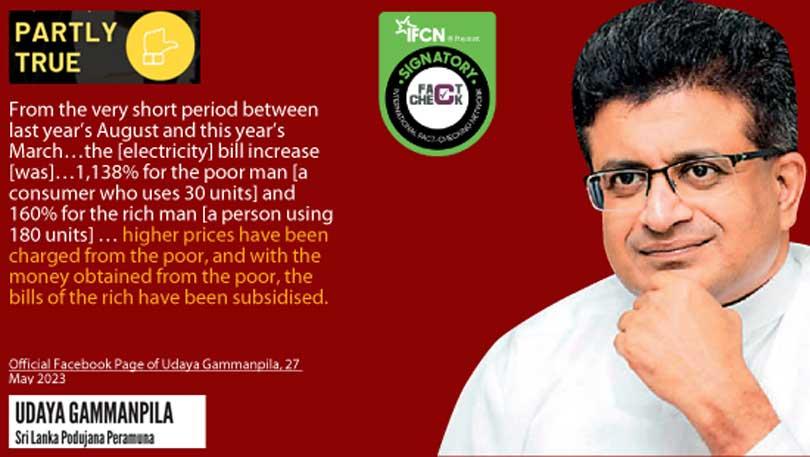22 Jun 2023 - {{hitsCtrl.values.hits}}

 The MP makes two overall claims about the recent tariff hike in February 2023. First, the electricity bills of the ‘poor’ have increased by a significantly higher percentage compared to the ‘rich’. Second, the ‘rich’ have received a concession at the expense of the ‘poor’. To support these claims, the MP provides calculations: an 1138% increase in the electricity bill for individuals categorised by the MP as ‘poor’ (consuming 30 KwH per month) and a 160% increase for individuals categorised as ‘rich’ (consuming 180 KwH per month).
The MP makes two overall claims about the recent tariff hike in February 2023. First, the electricity bills of the ‘poor’ have increased by a significantly higher percentage compared to the ‘rich’. Second, the ‘rich’ have received a concession at the expense of the ‘poor’. To support these claims, the MP provides calculations: an 1138% increase in the electricity bill for individuals categorised by the MP as ‘poor’ (consuming 30 KwH per month) and a 160% increase for individuals categorised as ‘rich’ (consuming 180 KwH per month).
To check these claims, FactCheck.lk consulted the draft working paper A cost-based model for differential pricing of electricity, for households in Sri Lanka shared at the energy sector roundtable by Verité Research, and the website of the PUCSL for the published changes in the tariffs.
Electricity prices were revised in November 2014, August 2022, and February 2023. When the MP mentions increases since August, it appears that he is actually referring to the price revision in November 2014, which remained in effect until early August 2022.
On claim 1: The MP, when interpreted as comparing against the prices set in 2014, is correct in claiming that those consuming 30 units (the ‘poor’) have experienced a significantly higher percentage increase in their electricity bills (by 1138%), after the tariff revision in February 2023. By contrast, those consuming 180 units (the ‘rich’) had a tariff increase of 144%, which is even lower than the 160% cited by the MP.
On claim 2: The MP claims the ‘rich’ have received a subsidy at the expense of the ‘poor’. However, this claim is not supported by the data. When examining the difference between the average cost per unit produced and the price paid by the ‘rich’ and ‘poor’. The concession (the average price below the average cost) per unit for the ‘poor’ decreased by LKR 12.46. The premium per unit (the average price above the average cost) paid by the ‘rich’ increased by LKR 4.71. Therefore, while the concession to the ‘poor’ decreased by 75%, the premium on the ‘rich’ did not decrease as claimed by the MP (by saying that the ‘rich’ were subsidised by the ‘poor’). Instead, the premium on the ‘rich’ increased by 210%.
To summarise, the MP’s claim that the percentage increase in electricity bills for consumers using 30 units (‘poor’) is much higher than for consumers using 180 units (‘rich’) is correct. However, the claim that the price increase for the ‘poor’ has subsidised the ‘rich’ is entirely incorrect.

FactCheck is a platform run by Verité Research.
For comments, suggestions and feedback, please visit www.factcheck.lk.
02 Jan 2025 1 hours ago
02 Jan 2025 2 hours ago
02 Jan 2025 3 hours ago
02 Jan 2025 3 hours ago
02 Jan 2025 4 hours ago